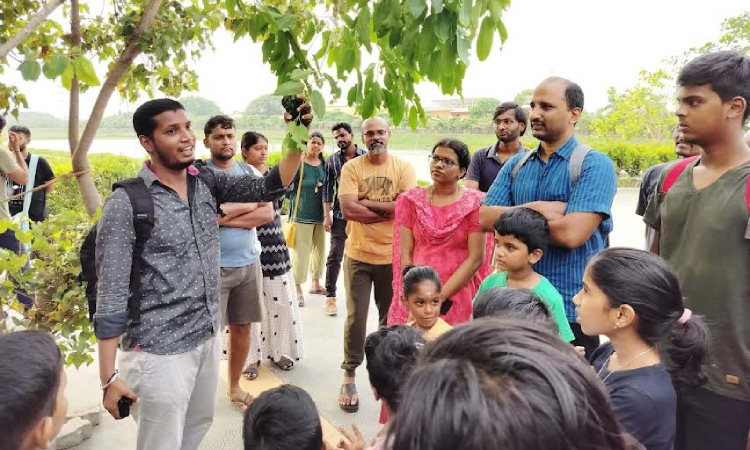Nature walks gain ground in Chennai’s climate awareness movement
For many young people, environmental action begins with a simple walk. Through nature walks and mapping exercises, students and residents are learning to notice and care for the ecosystems around them

From Suzhal Arivom’s walk
CHENNAI: With awareness about climate change growing at an exceptional rate, more people are becoming interested in what it means, its impact on their lives, and what they can do to contribute to its solution. From reducing waste to adopting sustainable lifestyles, individuals are taking small yet meaningful steps. One simple way to begin is by reconnecting with nature, and that’s exactly where nature walks come in. In recent years, Chennai has been witnessing a steady rise in nature-related walks, reflecting a growing curiosity about the environment and local biodiversity. Nature walks offer a chance to spot native plants, birds, insects, and understand how biodiversity plays a role in our lives. They also provide a much-needed escape from pollution, traffic, and crowded city spaces, promoting both environmental awareness and mental well-being.
An insect walk with children examining the leaf litter for insects
Suzhal Arivom, an environmental awareness group, has been actively organising nature walks and conservation initiatives since 2016. Their mission is simple but powerful: to bring people closer to nature and help them understand the ecosystems around them. Deepak Venkatachalam from Suzhal Arivom points out that discussions about the environment are still rare in most public spaces. “There’s no point in giving lectures about environmental issues in closed halls alone to a limited audience. Real understanding comes when people step outside and see things for themselves. Our goal is to help them reconnect, to remind them of the forests, wetlands, and wildlife that still exist around them.”
He emphasises that awareness begins with familiarity. “If you don’t know your surroundings, how will you protect them? Nature walks help people observe native species of plants, birds, and insects. It’s not just about walking, it’s about learning to see, listen, and appreciate the living world around you. That’s the first step toward caring for it.”
Examining the sands for biodiversity during a shore walk
Deepak believes that building interest, especially among the youth, is critical. “Climate change is one of the biggest threats to humanity. We’re already seeing the effects: rising temperatures, unseasonal rains, urban floods. These are not abstract ideas anymore; they’re part of our daily lives. But we’re not here to blame anyone. Our focus is on awareness and participation. Over the years, we’ve conducted more than 100 nature walks, each one opening someone’s eyes to what they had overlooked before.”
He shares that environmental action doesn’t have to begin with something big or complicated. “Anyone can get involved. You can start by living a little more sustainably, reducing what you consume, avoiding unnecessary waste and using what you have. A minimal lifestyle isn’t about sacrifice; it’s about making more mindful choices. That can be the beginning of a much larger journey toward environmental responsibility.”
The Madras Naturalists’ Society (MNS) took the idea of local awareness even further by launching an Urban Wilderness Walk Internship in 2021, during the height of the pandemic. The first batch was conducted online, but the response was promising. Dr Kalpana from MNS reminisces, “We were surprised to see so many students showing interest in learning about local biodiversity in their homes. We helped them observe things like spiders, insects, birds, from their balconies or streets.”
The initial goal was to get students to start mapping biodiversity in their neighbourhoods. “The idea was small - can we create a biodiversity map of a street? And maybe, one day, of all of Chennai?” Kalpana says.
Through the internship, the MNS team encouraged students to be curious, to look closely at the world around them, and to share their knowledge with others. “We’re now in our sixth batch. What’s most heartening is that many students who completed the internship are continuing the work by teaching others,” she adds.
Interns of Madras Naturalists’ Society being trained to conduct nature walks
“We’re trying to raise awareness about different types of ecosystems like forests, wetlands and coastal areas. Each one plays a critical role. There’s research showing that children who grow up closer to nature are more empathetic. And we’re beginning to see that interest in nature is growing, especially among the younger generation.”
Shobha Menon, founder trustee of Nizhal, a not-for-profit trust that promotes concern for trees, says that a nature walk can be a great learning opportunity and can offer different experiences for students across subjects. “They can be exhilarating, fun, and inspirational! However, it is important to remember that the most important step is moving from awareness toward proactive action. That is a step both the participants and the guides of these awareness walks must deeply understand. We live in a time when the environment is besieged by many challenges. We need to act quickly and sensitively. Sustained and proactive efforts to support our environment require careful and thoughtful action. Mere ‘awareness’ is not enough.”
Across Tamil Nadu and beyond, nature walks are slowly sparking a quiet revolution. Whether they’re organised by grassroots groups or educational institutions, these walks are helping people see what they’ve been missing: a world of biodiversity hidden in plain sight.



